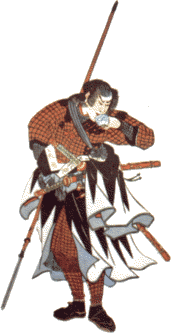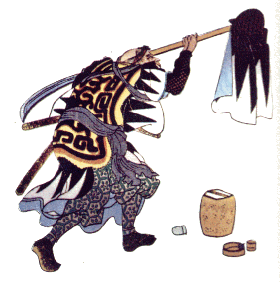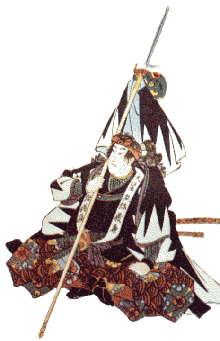|
"The saber is a treasure in its sheath." ( Japanese proverb ) The first reason for being of a martial art, before any philosophical reflection, is simply to provide means of surviving an extremely violent conflictual situation. That is why any "empty hand" technique ( i.e. "Kara Te", by definition, but I mean it here as a generic term, to make things plain, for many techniques sharing the same technical process as Japanese Karatedo ) must aim for the development of a body and mind with a "cutting edge", in the true meanig of the word: body and mind trained as a weapon, as a saber... in order to remain faithful to the spirit of Tradition and at the same time be realistic in our changing world ( where one no longer gives words their true meaning, therefore being content with shallow substitute concepts ). It must aim at developing a truly "sharp" body and spirit: the body and the spirit trained as an weapon, as a saber... To practice a martial art, is to learn how to manipulate a weapon, or else nothing makes sense anymore... I know it is not easy. |
|
|
This is precisely where the problem is. The weapon’s image is by definition negative in our society that prefers to ignore a disturbing dark corner and condemns globally and beforehand anyone who dares take that issue seriously. |
|
|
The weapon evokes violence violence,
destruction, death. The lethal aspect ( = deadly ) conveyed by its image
cannot legitimize its existence in a society trying hard to look "civilized".
So is it still possible to make understand that all weapon is inactive in
itself and that ( a fundamental reminder of all traditional martial
knowledge ) the ultimate weapon is the mind...? The rest may be a bonus,
incidentally. But now this has been said, henceforth it no longer seems
necessary to me to discuss that issue here. |
|
|
Certainly, the very existence of a weapon can be
harmful when given to someone that is not prepared, neither technically (risk
of physically uncontrolled manipulation), nor mentally (risk of using it
outside of the " right spirit" ). I choose not to address that
situation: I wish to write only for people actually practising a martial
art ( i.e having a weapon and an ethics), not for those whose
irresponsible behavior would rather remind one of the sinister Lords of
the War in ancient kingdoms of China. For there never should be an
accident in the practice of a martial art, that is to say something that
would happen inadvertently, that one would not have truly wanted. There is
no being surprised by a technique that would escape us and whose
efficiency could suddenly prove unsuspectedly destructive. That is also
why an authentic martial practice never can be interpreted as playful. The
rules for using these techniques are so strict and filled with graveness
that they would not be used in a game. Or else they lose their essence. It
is because these rules lead to something different: to bring the martial
student to a daily behavior, inside as outside of the dojo, all the more
exemplary that he/she has accepted the responsibility for the detention of
a real "weapon". This is the core of the problem.
In martial arts, the learning of techniques (surface) goes along with
the building of a mind capable of evaluating the stakes of a possible
confrontation with external violence. The progress, both technical and
mental, following precepts of the "Way" (Do, Michi...) aquires
thus a real educative value for life in society: I mean the fully aware
respect for others, their physical integrity, perhaps their life. This
respect can only find a limit in the imperious necessity to preserve one’s
life or the life of someone that cannot protect it alone. Hence, any physical confrontation becomes an extremely serious affair
and has to remain absolutely exceptional, one refusing to indulge into any
manifestation of the "ego", the superficial self...).It should
be the very last resort, by no means a pleasing thing, and it should
result from a decision, a choice, a will of control, with the whole
acceptance of the responsibility of all possible consequences that
decision may have. Of course that would take place under a lot of stress,
under the brutal impact of an adverse aggressiveness, in a short fraction
of time that disturbs all normal perceptive abilities. The traditional
teaching, with this notion of research of the internal mastery and
discovery of the constructive value of a chosen non-violence (and not
performed out of weakness), meets the accepted range of action defined by
the modern legislator ( possible application of a minimal defense force,
necessary and sufficient, without excuse in case of excess). Tradition is
an educative lever: to take care of the sabre, to want to possess the best
that is, but to refuse to draw it just to show how well polished it is, to
be envied or to have one’s 15 minutes of fame... One must train with a
wooden sabre (bokken) while thinking that each time it slices, to perform
each technique "as if", with whole body and spirit, without ever
allowing oneself to wish to prove "just to see if it works",
"just for fun"… |
|
|
Can you see the open trap for the ego...? This has
nothing to do with the winning of a title, a superiority acknowledged by
an audience, the flattery of the "self". Because there is no
common measures, contrarily to what it is commonly admitted, between the
aggressiveness that can be displayed in a competition and the possible
violence in a fight for survival.
One must sharpen with extreme care his/her weapon, without ever wishing
to use it, not even to show it... Such is the well-known yet rarely
understood or accepted paradox in truly martial ( by definition related to
violence ) arts !
|
|
|
I understand however that one might wish to "play" fighting, but provided that it is not taken seriously. Playing while exchanging techniques, but also keeping the spirit of the game, is possible. The attempt to prove a superiority in an competitive assault is acceptable only if included in a playful dimension, therefore respecting conventions. This step, however, is not an indispensable stage to progress in martial arts, far from it ! It may often be a "manly" game, but since it follows rules that always make the assault partial, the results are therefore highly debatable in a real combat for survival. Yet who is ready to admit the obviousness of this notion of relativity in such a demonstration, in general largely validated by an audience whose ignorance of reality favors mistakes ? This confusion begets two dangers. First, using game rules to give free expression to violence (gestural, verbal, and mental) displayed with the complicity of all, to the only purpose of pumping up the ego, convinced of the efficiency of what is "played", is an extremely dangerous drift. A drift that is radically opposed to the discovery proposed by the martial way, and where many have wasted chances that they had in the first place.
|
|
|
As in a bad role-playing game, one might go crazy beacause he took the game too seriously. Harmful for oneself ( false feeling of invulnerability ) and for others ( uncontrolled actions ). Nowadays, a big amount of violence is commonly admitted in many sports ( not just fighting sports ), even encouraged in the name of victory at all costs. Does the so-called need for release in our troubled societies justify excessive behaviors ? |
|
|
It is nevertheless aberrant to take note on the one hand of a largely displayed violence in stadiums and rings ( clearly evolving into "games of gladiators"), commonplace in a civilization striving to appear "civilized", and on the other hand to notice how that same civilization is shocked by the mere evocation of an "armed" practice ( i.e a martial practice ) which still dares to say its name, in which the gesture to mutilate or kill is only suggested with an absolute control ! No justification is accepted in martial art, where there is no alibi to the display of a gratuitous violence, whereas it is so easily found in competitive practice. Where is then the educative aspect of a practice ? |
|


